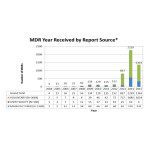 The FDA logged a nearly 1,400% spike in complaints filed over the Essure permanent female sterilization treatment made by Bayer (ETR:BAYN), according to a review released yesterday ahead of an FDA advisory panel meeting this week.
The FDA logged a nearly 1,400% spike in complaints filed over the Essure permanent female sterilization treatment made by Bayer (ETR:BAYN), according to a review released yesterday ahead of an FDA advisory panel meeting this week.
Essure, the only approved permanent birth control device in the U.S., is a small metal coil that is placed in the fallopian tubes via catheter. The FDA approved the device in November 2002.
In the near 13 years since then, the health regulator said it had received 5,093 complaints, including those of pain or menstrual irregularities after using the device, as well as complaints of the device breaking. Those adverse event reports include 5 fetal deaths in women who became pregnant after using Essure and 4 adult deaths for reasons such as infection and uterine perforation, the FDA said.
There were 152 complaints filed in the FDA’s Manufacturer & User Facility Device Experience database in 2012; last year there were 2,259 complaints filed in the MAUDE database, a 1,386% increase. So far this year there have been 1,363 MAUDE complaints filed with the FDA, the agency said. The FDA cautioned that the complaints it received had limitations such as incomplete or inaccurate data and did not necessarily directly indicate a faulty or defective device.
The FDA’s Obstetrics and Gynecology Devices advisory panel is set to meet Sept. 24 to discuss the risks and benefits of Essure and has invited feedback from presenters, panel members and the public. Some 17,000 women who had the device implanted and claim it has hurt them are members of the Facebook group “Essure Problems,” run by Angela Lynch, who herself experienced problems with Essure. Complaints voiced by the women include chronic pain, heavy bleeding, fatigue and skin allergies.
Lynch, who was 28 when she was implanted with the device, had 3 children and did not want any more.
“Because I had just had a kid I wrote off all my symptoms as hormonal, my body trying to adjust,” she said. “After 2 years I started losing hair. Then I started losing teeth, and over time it got to where my whole body was hurting.”
In 2012 she had the device removed and underwent a hysterectomy.
“After 3 days it was like I woke up from a 5-year flu,” she said.
In May, Bayer cited a 364-patient 5-year study of the device published in the Journal of Minimally Invasive Gynecology that indicated no pregnancies after 5 years and that the Essure inserts were “generally well tolerated.” Pelvic pain was reported in no more than 7% of patients, but no study participants reported persistent pelvic pain of any kind at the 3-, 4-, and 5-year follow-up visits, according to Bayer.
The study reported 3 serious adverse events “possibly related” to Essure in the trial, including irregular menstrual bleeding, lower abdominal pain and heavy periods and continuous bleeding. The latter 2 patients ended up having hysterectomies.
Dr. Patricia Carney, the company’s medical director for Essure, said Bayer welcomes the discussion. “We want to understand as a company what is going on,” she said. “We want to know whether there is a link to the product.”
In February a citizens petition lodged with the FDA asked the safety regulator to take Essure off the U.S. market, alleging that the clinical data the FDA used to approve the device was fudged and that the company concealed adverse events associated with Essure.
In July, the FDA approved using transvaginal ultrasound as an alternate test to confirm if the Essure implant has been placed properly. A month later Bayer cut the ribbon on a new plant in Costa Rica where it plans to make Essure.
Material from Reuters was used in this report.

